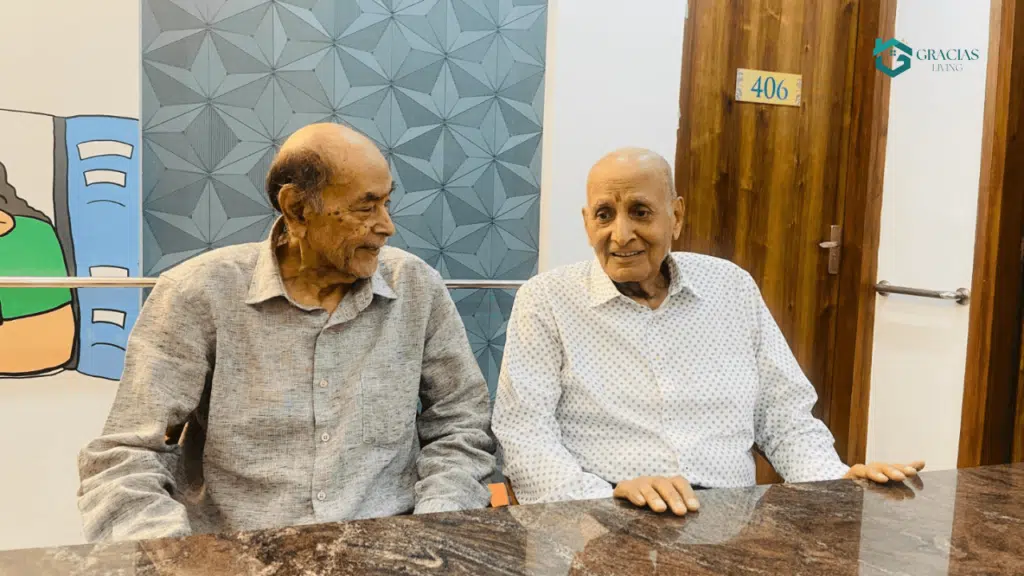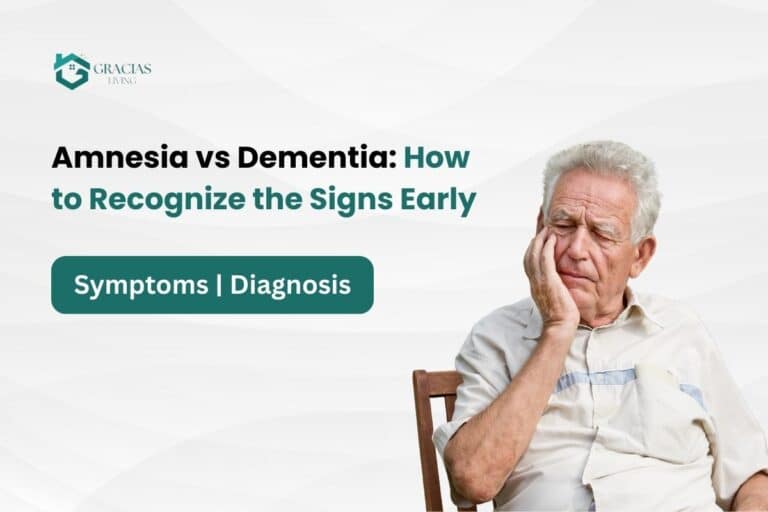Quick Summary of the article:
- Respite care refers to a short-term break from caregiving duties.
- Respite Care can be categorized as in-home- care, assisted living, daycare, and residential care.
- Respite care helps you to focus on your health and prioritize self-care.
- The benefits of respite care are prevents burnout, improves caregiver health, and enhances quality of life.
- Respite care can also help your loved ones whom you are caring for by providing them with simulation, diversity, and a change in their daily routine.
Respite care is short-term, temporary care offered to seniors when their primary caregiver—often a family member—needs time to rest, travel, or attend to other responsibilities.
It can last from a few hours to several weeks.
At Gracias Living, seniors receive expert care, daily assistance, medical monitoring, wholesome meals, and opportunities to socialize in respite care. It’s ideal for:
- Recovery after hospital stays
- Caregiver vacations or work travel
- Emergency support or transitions to long-term care
Whether it’s for a few days or a few weeks, we provide a comforting home where both caregivers and seniors benefit from our Respite care program

Or perhaps you believe that it is improper for you ever to become weary of taking care of someone you love, particularly if you are a child taking care of a parent. Maybe you’re just concerned that your loved one won’t receive adequate care from the person taking over.
All of these are typical excuses for refusing respite care.
Respite care is a crucial component of the caregiving process, though, and it benefits not only you but also the person you are caring for and your family as a whole.
Caring for a loved one can be incredibly rewarding, but it can also exhaust you physically, mentally, and emotionally. Respite care plays a vital role in giving the primary caregivers a temporary break to focus on their well-being and enhance the care required for both their loved ones and themselves.
What Are Respite Care And What Types Of Respite Care
Respite Care refers to a short-term break for the primary caregivers who provide care for individuals with various needs, including those with disabilities, chronic illness, or age-related dementia.
Respite care can take place in your home, day-care centers, or at any residential or nursing facilities.
Seeking respite care, whether for a few hours each week or a long vacation can help you in reducing the strain of caregiving and aid in stress reduction, energy restoration, and life balance. Additionally, it can help you avoid burnout, loneliness, and exhaustion.
Respite care can also help your loved ones whom you are caring for by providing them with simulation, diversity, and a change in their daily routine.

Types of Respite Care
4 Types of respite care can help you in taking the much-needed care and break for caregiving.
Discover which one can best suit your needs.
- In-Home Care: For short-term relief and where you can supervise the level of care you can go for in-home care. In this professional caregivers come to the home and take over the care duties for a specified period which might include daily monitoring of the vitals, helping your loved ones in daily activities of living, and administering medications.
- Helping Hand: The primary caregiver can ask the extended family or friends to take over while you rest or run some errands.
- Adult day care: Some facilities offer a daycare facility where your loved ones are safe and taken care of during the day. This allows the primary caregiver to take time to complete their tasks for the day, rest, and focus on themselves.
- Residential Respite Care: Assisted living facilities provide extensive care and a supportive environment for your loved ones while you take a break from caring for them. These facilities offer short-term and long-term stays depending on your needs. These facilities help your loved ones by providing them with:
- Comfortable home-like spaces
- Safe Environment
- Nutritious and timely meals
- Companionship
- Recreational activities that help stimulate their brains
- Health services

Why Respite care matters and why it is important
- Prevents Burnout: Caregiving can be physically, emotionally, and mentally exhausting which can lead to an increase in irritability and burnout. Respite care allows caregivers to take the necessary break to prevent burnout and ensures they can continue providing the quality care needed for their loved ones.
- Improves Caregiver Health: When an individual is well rested and rejuvenated, they are better equipped to handle the challenges of caregiving. Respite care helps you maintain your own physical and mental health as it allows you to give time to focus on yourself.
- Enhances Quality of Life: Many caregivers prioritize the needs of their loved ones over their own, often neglecting their health and well-being in the process. Respite care empowers caregivers to focus on self-care, pursuing their hobbies, and spending time with friends and family.
- Family Relationships: Continuous care for our loved ones can strain relationships, often leading to frustration and conflict among family members. Respite care provides a much-needed break for the caregiver where they can assess their situation without feeling overwhelmed. The time apart can help the family members communicate more effectively and maintain a healthier relationship.
- Promotes Engagement: Respite Care helps your loved ones by allowing them to interact with new people in a community-based set-up like a day-care center or an assisted living. These facilities can help promote social interactions and cognitive stimulation which leads to an enhanced quality of life for your loved ones and reduces the feeling of isolation & loneliness.
Respite Care Financial Implications
The cost of respite care will depend on the nature, the period and the facility selected. Services could be on a daily or hourly basis, and there are differences in the rates of in-home care and facility care services.
Part of the costs could be covered by some insurance plans, long-term care, or government programs to relieve families of the financial burden.
The Process of Selecting the Right Respite Care Provider
To choose the appropriate respite care provider, it is necessary to evaluate the qualifications, safety standards, and the level of comfort of your loved one. Seek professionals, alternative schedules, and open prices.
Reviewing reading, paying a visit to the facility, and talking about specific needs are sure to help you make a choice in terms of reliable and compassionate respite care services.
Conclusion
Respite care gives families the chance to take a short, much-needed break from daily caregiving.
This temporary support allows caregivers to rest, recharge, and focus on their well-being, knowing their loved ones are safe and well-cared for. It’s essential because it prevents caregiver burnout and helps maintain a healthy, balanced life for everyone involved.
Respite care also provides loved ones with fresh interactions and often brings new energy into their routines, making it beneficial for both caregivers and those receiving care.
Frequently Asked Questions
1. What is another name for respite care?
Short-term care or temporary relief care is also referred to as respite care. It allows family givers to be free of the day-to-day cares and, at the same time, be assured that their loved one will still receive professional and compassionate care in a safe and comfortable setting.
2. What happens in respite care?
In respite care, skilled nursing personnel assist with day-to-day activities such as bathing, eating, and medication administration. The patient can also have recreation or therapy that is light. Such an arrangement provides both caregivers and care recipients with rest and emotional balance.
3. Can respite care be provided in assisted living or care facilities?
Yes, There are numerous assisted living communities and care facilities that provide respite care. The services can be used by temporarily staying with seniors who require additional comfort or rest.
4. Is respite care only for elderly patients?
No, Although respite care applies mostly to elderly people, it also applies to all people of any age with disabilities, chronic illnesses, or special needs. It is aimed at offering quality temporary care in order to offer a chance to primary caregivers to have rest or to meet any other obligation.
5. Can families combine respite care with long-term care?
Absolutely, Respite and long-term care can be mixed in the family and become flexible. Respite care is an addition to the existing care regimens to provide short periods of rest to caregivers and allow them to deal with stress and continue to provide the necessary quality care to their loved ones.





